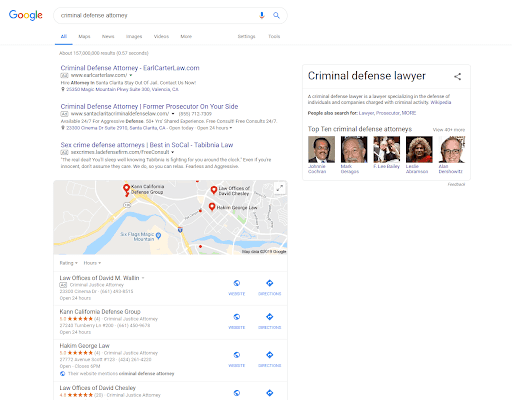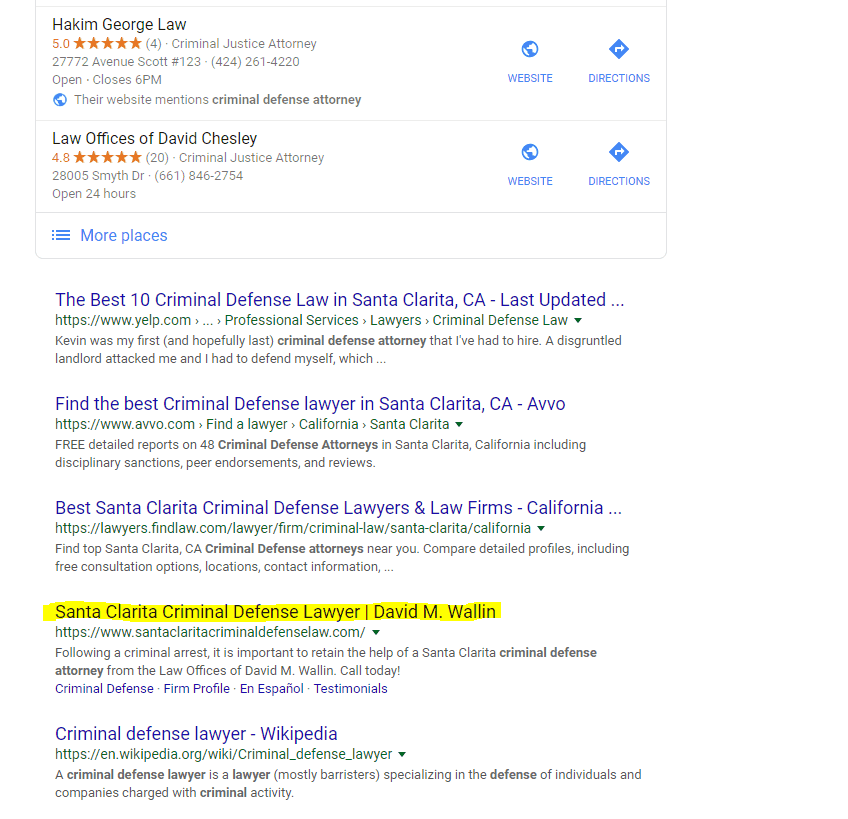For years, attorneys have been told that their ranking in search engines (e.g. where their website shows up in a Google Search) is the be-all, end-all of a healthy digital presence.
Organically rank on page #1 or #2 of the search results, and you can assume the digital presence of your law firm is rock solid...
Or so the story went.
But the Internet is an ever-evolving entity, and what was true ten, five, or even one year ago, isn’t necessarily true today.
Which is why attorneys shouldn’t be too surprised by the following statement:
Search engine optimization—the mechanism by which a website is made to organically rank—isn’t as important as it used to be.
That isn’t to say SEO isn’t still important (it very much is), it’s simply to say that investing in the acquisition of a strong organic search ranking isn’t necessarily the best way to get your website to the top of the search engine results page, or bring new clients to your firm.

In the screenshot above, you can see the results for a typical, legal-focused Google search, “criminal defense attorney.”
On the page, the first three results are paid ads, and the next four results are map listings which means even if a criminal defense firm owned the #1 organic ranking for the search term “criminal defense attorney,” a potential client would be exposed to no less than seven other law firms first.
In actuality, the first law firm to actually rank organically on the page doesn’t appear for a while…Appearing in the 11th spot on the page, underneath the three paid ads, the four map results, and three legal directory results.

How can “Santa Clarita Criminal Defense Law” appear so far down the search results page, despite having an exceptional website with great search engine optimization?
It can appear that far down because Google is restructuring its results pages to place greater emphasis on what’s best for the user (e.g., websites with lots of high-quality, informative content) and sources of revenue for Google’s bottom line (e.g., keeping paying advertisers happy).
What matters most for attorneys
Where search engine ranking could once greatly influence the number of leads or clients a legal practice could retain, now it doesn’t play that big of a role, which is why attorneys don’t need to worry about where they’re “ranking” for critical keywords like they used to.
Yes, SEO and site ranking are still important, but they’re important from a branding perspective, not a lead-generating perspective.
Put another way, think of SEO and site ranking as “signage” for a law firm—like a digital billboard, or newspaper advertisement—not as a core component of a prospect-attracting, client-retaining, needle-moving strategy.
SEO is about maximizing the brand relevance of legal practice—it is not about getting results, where “results” can be defined as organic traffic and leads that become new clients and new cases.
Good SEO practices and a strong search engine rank are about increasing a firm’s overall exposure to a specific community or audience, and using that exposure to cement the authority and expertise of the firm in the eyes of potential clients.
Therefore, legal practices that are investing their hard-earned dollars and cents in working with a marketing company shouldn’t measure the success of that investment by asking line-item questions like “Where is our website ranking?”
Rather law firms should ask broader questions like “Are we experiencing more success (more clients, more cases, more revenue, more exposure, etc.) than when we started working with this marketing company?”
If the answer to a broad question like that is, “Yes”, then it’s clear the relationship with the marketing partner is paying dividends.



